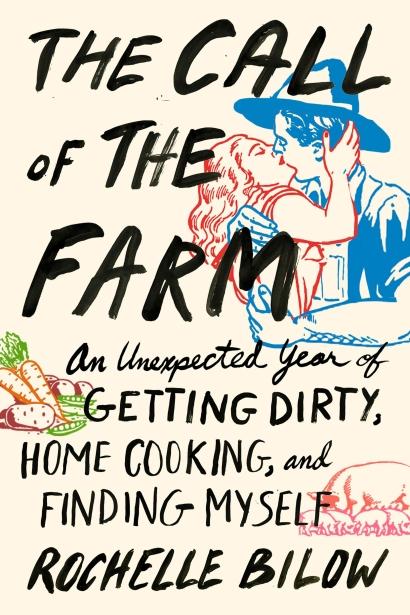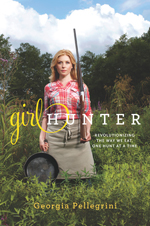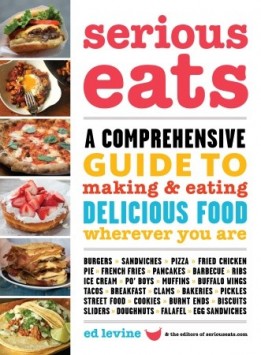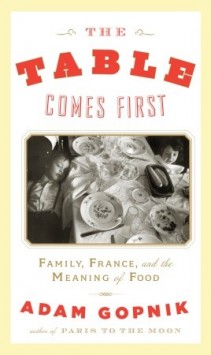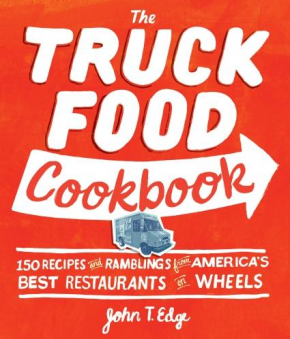The Call of the FarmAn Unexpected Year of Getting Dirty, Home Cooking, and Finding Myself
Rochelle Bilow, a classically trained cook and aspiring food writer, was nursing a broken heart and frustrated with her yet-to-take-off career when she set out to write a short profile of a small, sustainable CSA farm in central New York.
Rochelle Bilow, a classically trained cook and aspiring food writer, was nursing a broken heart and frustrated with her yet-to-take-off career when she set out to write a short profile of a small, sustainable CSA farm in central New York. At most, she expected to come away with a cute city-girl-in-the-country piece. But after just one day of moving hay bales, feeding pigs, and tapping maple sap, she was hooked: The air was fresh, her muscles felt useful, and the smells from the kitchen where the farmhands gathered at day’s end were intoxicating.
Add in a sweet but enigmatic young farmer whose soulful gaze meets her own, and The Call of the Farm is set in motion. This enticing memoir charts the unexpected year that unfolds as Rochelle immerses herself in life at the farm. She cooks her way through four seasons of fresh-from-the-earth produce (with such tantalizing results as Blistered Tomato Gratin and Crisped Potato Casserole with Shaved Chives), grapples more than once with the finer points of rendering lard, and begins to feel she has finally found her niche—all while falling hard for that handsome, blue-eyed farmer.
 ROCHELLE BILOW is a food writer and a classically trained cook with a Grand Diplome in Classic Culinary Arts from the French Culinary Institute. As a staff writer at Bon Appétit, she interviews chefs and covers food trends and seasonal cooking. Her writing has also appeared in Edible Finger Lakes, USA Today, the Syracuse Post-Standard, Food Traveler, and others. She lives in Brooklyn.
ROCHELLE BILOW is a food writer and a classically trained cook with a Grand Diplome in Classic Culinary Arts from the French Culinary Institute. As a staff writer at Bon Appétit, she interviews chefs and covers food trends and seasonal cooking. Her writing has also appeared in Edible Finger Lakes, USA Today, the Syracuse Post-Standard, Food Traveler, and others. She lives in Brooklyn.
The Call of the Farm is Rochelle Bilow’s new book. Recently she was kind enough to take some time and talk to Booksaboutfood.com about leaving the city and living and working on a farm for a year, and how it changed her views about food, the people who grow and raise it as well as her own cooking.
Booksaboutfood.com (BAF): Maybe you could just talk a little bit about the writing process because it is something obviously very personal.
Rochelle Bilow: It was interesting writing this book. It took me three months to write. In hindsight, it’s the sort of thing that you realize maybe that is not normal. Most people don’t write a book in three months. We were really excited about the project, and we really wanted to get it on the shelves as soon as possible so we just kind of like hunkered down and made it happen.
I actually wrote almost the entire book at a coffee shop called The Outpost on cusp of Fort Green. I went there every weekend day; every Saturday and Sunday. I just sat and I drank americanos all day writing the book and then like at 4:00PM, I would switch over to wine. It just became this really necessary part of the writing process to do it there.
There was one chapter that I actually wrote in my aunt’s minivan but beyond that, the entire book was written in that one coffee shop.
BAF: Three months, that is pretty quick.
Rochelle Bilow: It was.
BAF: Do you think the wine sped up the process at all?
Rochelle Bilow: No, I would always wait until the last hour of my writing to get into that. It was funny, I think it was also very helpful, looking at it now, to have written the book in a short period of time because the experience that I wrote about was relatively fresh. I had left the farm in May of 2013 and I wrote the book in the fall/winter of 2013. It was nice that I was able to write it while it was still very fresh in my mind.
BAF: Can you tell us a little about your background before this whole adventure unfolded? And what was your background in food, in cooking?
Rochelle Bilow: That’s a great question. I’m from Syracuse, which is close to where the farm is located. I grew up in Syracuse and I always wanted to be a writer and as I grew older, I became more and more obsessed with food. It seemed to be a perfect fit but at the time, there were so many food blogs available and it’s not so much a part of the culture now, but there were a ton of food blogs when I was considering being a writer.
I wanted to do something to differentiate myself from all of those food blogs. I really wanted to know what I was talking about. Anyone can say, “This soup is warm, this bread is crusty.” I wanted to have a greater knowledge base. I decided to go to culinary school. I enrolled in the French Culinary Institute, spent a year there, worked as a line cook, and also a catering cook.
From there, after I graduated from the culinary school and worked in the industry for a while, I moved back home to Syracuse for a little bit. I just wanted to be closer to my family. City living was getting me down. I’m a country girl at heart. Living in the city is tricky. It’s a challenge. I was freelance writing for a few years, doing freelance food writing for a few different publications, including Edible Finger Lakes, the Syracuse Daily Paper. An assignment to write about the farm brought me there and that’s how it all happened. Now, I live in Brooklyn.
BAF: You’re back in the city?
Rochelle Bilow: I am. I left the farm. I really took a hard look at my career goals and where I wanted to be. Farming was such a beautiful and necessary part of my personal history, but ultimately, I’m a writer and I write about food and I wanted to do it at a publication that I really loved and valued and admired. That’s what brought me to Bon Appétit. I’ve been back in the city for a little over a year.
BAF: Literally, on the first page of your book, you talk about you really felt you wanted to be at the farm. You felt you landed in something that was important to you. Was that something that is part of your, as you say, your country girl roots?
Rochelle Bilow: You know, I certainly didn’t grow up on a farm. I grew up in the suburbs. I really think that this was something that was just intrinsically programmed into my DNA. My father grew up on a dairy farm and before my parents went through the troublesome issue of having and raising children, they were homesteaders and grew a lot of their own food. They had an amazing garden and lived out in the country. I think it’s always something that’s just kind of been this underlying part of who I am and what makes me happy. I had never really tapped into that before, growing up in the suburbs and wanting to move to the big city and make it in the big time. I didn’t know that an agriculture and rural setting could feel so good but when I arrived at the farm, it was immediately tangible and confusing because I didn’t know what was happening.
BAF: Being at the farm, did that give you a new appreciation for where things come from and how they get to us and the whole process of that? Or a new respect for food?
Rochelle Bilow: I used to consider myself a local and seasonal food champion. I went to the farmer’s market and I bought organic vegetables. I didn’t really know what it meant to eat seasonally, to eat locally, and to support sustainable agriculture. It wasn’t until I found myself cooking on the farm that I really understood what that meant.
It’s one thing to buy organic lettuce in January but it’s an entirely different thing to find yourself on a farm in January and all you have is potatoes and rutabagas and turnips and oh well, you have to just figure it out. I learned the enormity and the difficulties of this style of cooking.
The other thing that’s funny is in culinary school, and for most home cooks also, you learn to cook by reading the recipe and then acquiring the ingredients that you need. On the farm, it’s actually the opposite. You look at the ingredients that are available to you and you decide what to make with them. That was an interesting switch for me.
BAF: You went from arranging things on the plate with tweezers to cooking for loads of farmers family-style. That must have been quite a change.
Rochelle Bilow: It was. I was constantly worried that I didn’t make enough food. I actually, when I left the farm, started cooking for myself again. It was a hard challenge because I would be making a pot of rice and I had to stop myself from putting like three cups of rice in the pot. Nobody eats better than farmers. Nobody appreciates food more. Nobody can put away more calories than young farmers. That was a challenge.
Of course, coming from a restaurant background, I wanted things to be precious and beautiful. There was a certain turning point for me where I just stopped trying to make everything beautiful and just tried to make it nutritious and healthy and really, really tasty.
BAF: They just want hearty food.
Rochelle Bilow: They certainly did. If I made a really nice dessert, there was this … In my book, there’s a recipe for a brown butter tart that I would make with butternut squash. It always got ‘oohs’ and ‘ahs’ but it was also just the excitement of calories and energy and sugar.
You’re cooking for the people who grow and raise the food so there’s this very inherent and intrinsic appreciation that they have for the food, which feels really good.
BAF: Did that add any pressure to you?
Rochelle Bilow: It wasn’t so much pressure as it was just a really beautiful reminder. I never took food for granted while I was there. Oftentimes, I was on the weekends, the one feeding hay out to the beef or I was the one bringing grain to the chickens. We all shared those responsibilities.
If you raise an animal, you appreciate it so much more. It’s just a totally different experience. Although, I will say we never ate the chicken the day that we slaughtered it. That was a hard and fast rule. We couldn’t appreciate it until we had a little distance from it.
BAF: Did you have any sort of epiphanies or did it turn anything that you had learned or thought you knew on your head?
Rochelle Bilow: There is actually a portion in the book very early on in one of the first chapters where Ian and I are cooking dinner together. He tells me that he wants to roast potatoes. After I chopped them, I didn’t know what his plan was and I thought, “Well I don’t want to let them sit out in the air because they will oxidize and turn brown.” So I got a bowl, filled it with water, and dumped all the potatoes in the water.
I felt so smart. I was like imparting my culinary school knowledge on him. He just looked at me and he was like, “What are you doing?” I explained my reasoning. He was like, “I was just going to throw some oil on them right now.”
Similarly, on one of our very first dates, we made a bolognese sauce. I was about to chop some carrots and I asked him for the vegetable peeler. He just looked at me like I had two heads and said, “We don’t have a vegetable peeler. You could rinse your carrots and then chop them.” It was like, “Oh my God, I’ve been spending so much time peeling carrots, for way too long.”
Now, if I can avoid it, I never peel carrots or beets or any vegetable that has been grown responsibly and not doused with pesticides. If I don’t have to peel it, I won’t.
BAF: What are you up to now? What’s next for you?
Rochelle Bilow: Gosh, well, you know I’m a staff writer at BonAppetit.com. I write for the website of Bon Appétit magazine. I love it here. I’m so happy to be working with this incredible brand and with such great people. I have wonderful colleagues. I’m loving exploring and doing the work that I do here. I will certainly be here for a while.
What’s up next for me in terms of writing a book? I would love to write a real cookbook with pictures. There are recipes in this book and they’re all the recipes I cooked on the farm. I’d like to do it up big and have gorgeous pictures and really dive into what cooking—for me—means. I eat a very farm-influenced diet. I’m not afraid of fats. I use lard whenever possible. Butter goes in and on everything. I’m all about using all of every ingredient. I would really like to explore that in a cookbook. That might be, well hopefully will be, next for me.
BAF: What have you brought back with you? But it sounds like you just answered this cooking with lard, hearty meals, etc.
Rochelle Bilow: Oh yeah. Totally. I’m so adamant that when you cook with food, you should honor that food. It just seems like, to be honest, if you just throw away your kale stems, for example, and just use the leaves, it gives a bit of an FU to the farmer who spent so much time growing it. Those stems are perfectly edible and delicious. You can just cook them. I’m really so much more conscious of what it takes to grow and raise food. That has really changed the way that I cook now.
BAF: Can you talk a little about the recipes that are in the book?
Rochelle Bilow: A lot of them were recipes that I found myself making again
The shepherd’s pie is so hearty and comforting and I found myself making it again and again because it just made use of ingredients that we always had available. It tasted good and it was really satisfying and I found myself cooking it constantly.
Also, some of the recipes are just recipes that were really important to my development as a character in this book and also a person. I went through the process of learning how to make homemade butter and that was something that really challenged me and really made me stand up to the things that were difficult for me on this farm. I described the process in such detail, I thought I would remiss not to actually include the recipe for butter. I ultimately learned how to make my own butter. I wanted to share that with everyone.
These are really just the recipes that I loved to cook on the farm and that the farmers loved to eat.
BAF: Was there ever an ‘ah-ha’ moment?
Rochelle Bilow: That’s an interesting question. I think I always knew that cooking was what I needed to be doing. Everything was so new to me on the farm. I felt the majority of work that I did there had to be taught to me. I didn’t know how to drive a team of horses, I didn’t know to stack hay bales, I didn’t know how to move chickens to fresh pasture. I didn’t know how to do anything. I had to be taught how to do everything except for cooking.
That was the one thing that I knew how to do and that I did well. That was my thing. I actually really settled into that really quickly because it was something that I had authority over and that I felt comfortable with.
BAF: Like your safe zone?
Rochelle Bilow: It was. It remains that the kitchen is where I feel really comfortable and really happy. That’s my jam. That’s where I belong.
© 2014 Booksaboutfood.com
“How to cook breakfast for hungry farmers”
By Rochelle Bilow
The first hint of cooler weather snuck in with September, and as the nights dipped down in temperature, I found myself baking bread with much more enthusiasm and greater routine. I began spiking the loaves with flax seeds and oats, the combination of nutty grains and toasted seeds adding a comforting depth. Bread was best loved at dinner, when it could be used to mop up sauce or soup, but if there was any left over, it went straight into the next morning’s meal.
When I cooked breakfast, I’d slice the loaf as thinly as I could, stretching it to feed as many of us as I assumed would be present that morning. I had brought a few of my culinary school knives to the farm, including a tragic mockery of a bread knife. It couldn’t have been duller—or more dangerous—and you really had to put your back into the process of sawing slices apart. Once you reached the heel, if it was smaller than two inches, forget it. No bread, no matter how crusty and chewy, was worth hacked-off finger nubs. When it got down to the butt end, it was best to just run it through the nine-pound tub of organic peanut butter (provided someone had made it to the grocery store that month) or hope the salted sweet cream butter had been sitting out at room temperature, rendering it soft and spreadable. You should just eat the evidence and pretend that it had never existed.
I’d place all the cut pieces on an ancient, perpetually grease-streaked cookie sheet, drizzle a bit of olive oil over each slice, holding the enormous jug as gingerly as I could, and mete out Scrooge-like dribbles over the bread. Then I’d turn them over and rub them into the pan, coating both sides with fat, pinching salt and black pepper between my thumb and index finger a foot above the table and releasing it in a shower. As the bread baked in the oven, cranked to a temperature I hoped was around 425 degrees but was never quite sure, considering that the oven’s calibration was about 100 to 200 degrees off, I sautéed loose breakfast sausage if we had it (ground pork doctored with chile flakes if we didn’t) and fried eggs on a stove top griddle. If I timed everything just right, I’d have already slid a fried egg onto each piece of bread and be in the process of scooping spoonfuls of pork over everything when the farmers arrived. Sometimes I slathered the toasts with Dijon mustard, or mayonnaise, or a combination of both, and if there were fresh greens—peppery arugula being a favorite—those went on, too. It was an open-faced sandwich to savor, though we always inhaled them, already hungry from the morning’s chores.
If we were lucky enough to have a whole, unadulterated loaf at breakfast, I just set it on the table with all of the correct accoutrements and let people make their own choices. We always had assorted jams to go with the butter, but left to my own devices, I often heated lard in a small cast-iron pan and fried a thick piece in it, pressing down on the bread with a fork to encourage an aggressively browned crust, to let the fat seep into every crevice.
Our hens periodically stopped laying enough eggs to feed both our CSA members and ourselves, and on the occasions that we didn’t have any for the house, I had to get a little creative. Sausage was frequent (although overuse was frowned upon by Jack, who painstakingly stuffed each link). Bacon was a luxury, typically relegated to the fatty ends that, when dealt with patiently, rendered a gorgeous amount of grease but resulted in little more than bacon bits. I was always happy to eat just oats and cream for breakfast, but felt a sense of responsibility to the rest of the farmers to produce rib-sticking morning meals.
If I was feeling particularly domestic, I’d tie on one of my aprons from Ian and whip up a batch of oatmeal muffins. I had made them so many times that I had the recipe memorized. It called for buttermilk, but when that wasn’t available—we didn’t make butter near as often as we should have—I poured a bit of bottled lemon juice into a measuring cup of cream-heavy milk and let it sit until the dairy took on buttermilk’s characteristically tangy flavor. That got poured over rolled oats and mixed with dry ingredients before I dolloped it into the twelve-cup muffin tin that I had greased with butter, or lard, or bacon grease, or whatever. I liked their size when they came out of the oven, properly small, the size of my fist and no bigger, and I liked how they greedily absorbed a pat of butter, tolerated a smear of orange marmalade.
Once or twice I made scones, but the amount of butter required for them seemed wasteful, and at the end of it all, it was a lot of dirty food processor parts for twelve humble pastries. As I carefully wiped the blade of the machine clean, I vowed never to take another scone for granted, and also promised to make them for myself weekly if I ever left the farm.
We tried to stay on top of the extra pantry items we needed that were not grown on the farm, but no one had taken ownership of that role, and we usually just watched our supplies dwindle, assuming someone else would replenish them. Once, due to an ordering oversight on my part, our pantry was plumb out of oats and flour, and there wasn’t an egg to be found on the farm. I felt particularly guilty, as Logan had offered to make breakfast that morning so I could spend a little extra time picking the horses’ feet. He roasted two chickens and shredded the meat into homemade stock along with potatoes and a shower of chives and scallion.
“This smells good, but I don’t really like chicken for breakfast,” I said, mixing crunchy peanut butter together with a handful of dates. I took a bite and immediately felt my mouth seal itself shut.
“I don’t really, either.” Logan shrugged. “But I didn’t know what else to do.”
It’s important for a farmer to eat a good breakfast. This is especially true if you happen to be a farmer at Stonehill in September, because you’re exhausted. You’re still dealing with the post-summer obligations: moving beef, killing chickens (thankfully, it is your last month of doing so), harvesting, possibly still planting or at least cover-cropping, feeding pigs (you are always feeding pigs), hell, maybe you’re even still making hay. But now you’re also readying yourself for the winter, creating room in your walk-in coolers and having the first go at washing and storing root vegetables, realizing that you should have preserved more and hoping to god that your members did. And plus, at this point—in September—you’re just exhausted. You’re sick of farming, and want a break. At least that’s how I felt.
Excerpted from The Call of the Farm: An Unexpected Year of Getting Dirty, Home Cooking, and Finding Myself by Rochelle Bilow, releasing on October 1 and available wherever books are sold. Reprinted with permission from the publisher, The Experiment.


